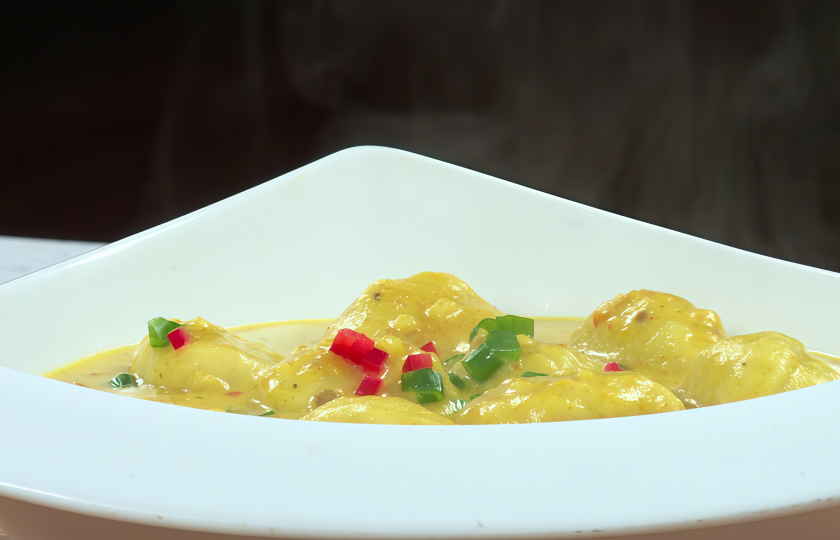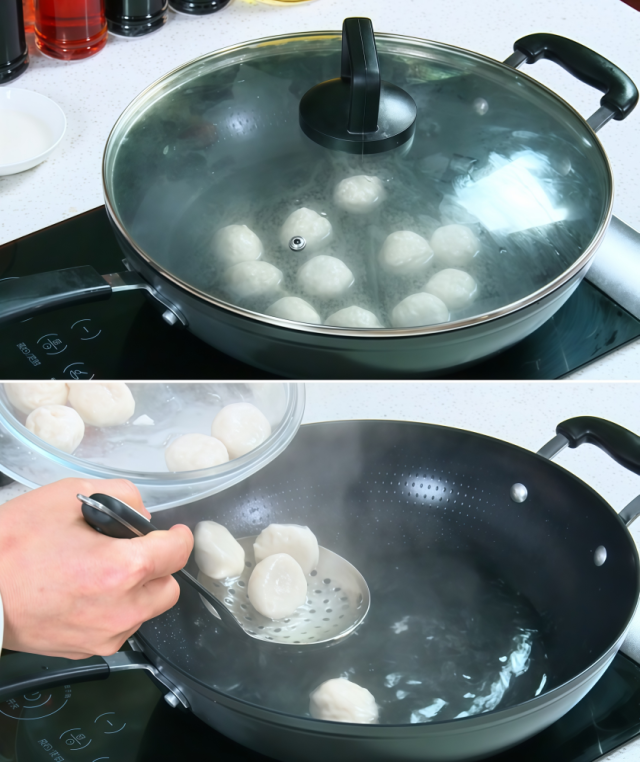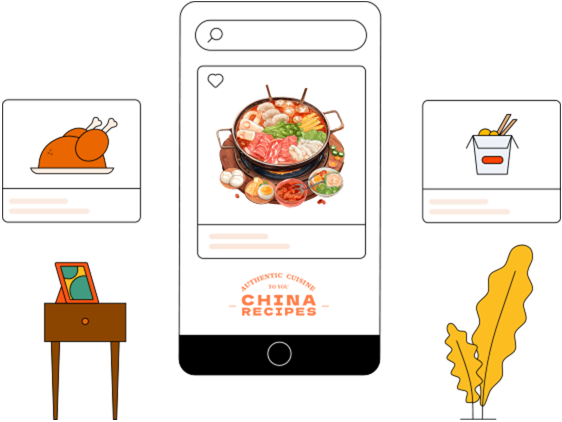Hong Kong Curry Fish Balls


Curry fish balls are not only the perfect afternoon tea snack but also an excellent choice for supper. Let me teach you some practical cooking tips to easily recreate the Hong Kong flavor.
What is the historical origin of curry fish balls?
The origin of curry fish balls can be traced back to the street stalls in Hong Kong. In the early days, street vendors, in order to reduce costs, often used inexpensive fish balls and covered up the fishy smell of the fish balls with rich, flavorful curry sauce.
Due to its simple and inexpensive production, it soon became a very popular snack on the streets of Hong Kong. As time has passed, curry fish balls have gradually evolved into a unique Hong Kong street food and have become one of the favorite fast foods for many people.
Today, curry fish balls are not only popular in Hong Kong but are also commonly seen in Hong Kong-style tea restaurants and street stalls in other regions.
What choices are there for the types of fish balls?
For this dish of curry fish balls, mud carp fish balls are highly recommended. They have a rich aroma and a good taste. Their combination with curry is particularly harmonious.
If you prefer a slightly more tender and smooth texture, threadfin bream fish balls are also a good choice. However, the traditional taste of mud carp fish balls pairs especially well with curry, making the overall taste more rich.

How to buy fish balls?
For this recipe, the fish balls you need should not be too large. So choose fish balls that are 3/4 to 1 inch wide.
Fish balls are usually sold fully cooked and are available in the refrigerated or frozen sections of Asian markets. Some fish balls are stuffed (usually the larger ones), but I prefer the unstuffed ones. You can choose pure fish balls (white) or fried fish balls (brown on the outside).
You can also make fish balls yourself - just make sure to boil or fry them first.
What does curry fish balls taste like?
Curry fish balls have a very unique sense of balance: the rich aroma and mild spiciness of the curry, combined with the fragrance of onion and garlic, gives it depth without being too overpowering.
With the soft milk aroma of the milk added, the whole taste is not greasy but rather smooth.
Fish balls themselves don't have a particularly strong flavor. But because they absorb the curry sauce, they taste rich and chewy. Personally, I find it very appetizing!
INGREDIENTS
Main Ingredients
-
·250g fish balls (round, about 1 - 2 cm in diameter)
Additional Ingredients
-
·30g onion (diced)
-
·30g garlic (minced)
-
·50g curry block
-
·50ml milk
-
·50g diced red bell pepper (for decoration)
-
·Appropriate amount of chopped green onions (for decoration)
Seasonings
-
·3g salt
-
·10ml cooking oil
-
·A little cornstarch slurry
Table of Contents
COOKING STEP
Step 1
Dice the onion and mince the garlic, then set them aside (these two are the key ingredients for stir - frying to bring out the aroma).

Step 2
Pour about half a pot of water into the pot. After the water boils, add 250g of fish balls. First, bring to a boil over high heat, then turn to low heat and cook for 10 minutes. Remove and drain the water.

Step 3
After the fish balls are cooked, heat 10ml of oil in the pot. When the oil is slightly smoking, add the diced onion and minced garlic. Stir - fry over high heat until fragrant.

Step 4
Add 50g of curry block and quickly stir - fry until the curry is well combined with the garlic and onion, emitting a strong aroma.

Step 5
Add the cooked fish balls and stir evenly to coat each fish ball with the curry.

Step 6
Add 200ml of water. After bringing to a boil, turn to low heat and cook for 5 minutes to allow the curry flavor to penetrate into the fish balls.

Step 7
Season with 3g of salt, then pour in 50ml of milk. The combination of the curry aroma and milk flavor enhances the taste.

Step 8
Add a little cornstarch slurry and simmer while thickening the sauce until it coats the sides of the pot.

Step 9
After plating, sprinkle with diced red bell pepper and chopped green onions for decoration. It looks extremely appealing!

More recipes worth trying
Lion's Head Meatballs with Crab Roe
Red Date Longan Sweet Soup With Egg
Chef's Tips
Cooking time for fish balls in water: When boiling fish balls, bring the water to a boil over high heat first. During the cooking process, the heat should not be too high, so that the fish balls will not become overcooked and can maintain a bouncy and tender texture.
Stir - frying onion and garlic until fragrant: When stir - frying diced onion and minced garlic, heat the oil slightly, but not too hot. Otherwise, it is easy to burn. Stir - fry quickly over high heat to release the most fragrant flavor.
Melting the curry block: When adding the curry block, make sure to stir evenly until the curry block is completely melted. Only in this way can the aroma of the curry be fully released.
Timing of adding milk: It is best to add milk after cooking the curry for a while. This can make the curry flavor and milk flavor blend better, resulting in a richer taste.
Thickening with starch: The amount of cornstarch slurry should be appropriate. During the cooking process, you can check the thickness of the sauce at any time to avoid it being too thick or too thin.
Final decoration: Sprinkling with diced red bell pepper and chopped green onions not only enhances the appearance but also makes the taste fresher and adds layers of flavor.
What to Pair with Curry Fish Balls?
Preferred staple food: Coconut - scented rice. The white rice absorbs the spicy aroma of the curry sauce. Paired with roasted coconut flakes, it adds a nutty aroma, forming a complementary taste - bud experience of texture with the bouncy fish balls.
Side dish to relieve greasiness: Cucumber and yogurt salad. The combination of crispy and tender cucumbers with the sour and spicy mint yogurt can effectively neutralize the heaviness of the curry and balance the overall taste experience.
Creative upgrade: Grilled asparagus and shrimp. The slightly bitter taste of asparagus and the sweet taste of shrimp contrast with the fresh flavor of fish balls, enhancing the sophistication of the dish.
Clever use of sauce: The remaining curry sauce can be used to cook corn or mix with pasta. After heating, the flavor becomes more concentrated, achieving multiple uses for one sauce.
How to store it?
Put the cooked curry fish balls in a sealed container. They can be stored in the refrigerator for about 2 - 3 days. Just reheat them when you want to eat.
If you want to store them for a long time, separate the fish balls from the curry sauce, put them into freezer bags, seal them well, and store them in the freezer.
When reheating, it is best to use medium or low heat and warm them slowly to avoid the separation of the curry sauce or the hardening of the fish balls due to high temperature. Adding a little water or milk to adjust the consistency will also make the taste better.
FAQs:
However, the curry block will melt into a thick sauce. When using curry powder, you need to pay attention to the amount of water added to ensure that the sauce doesn't become too dry.
After mincing the fish into a paste, some starch and seasonings are added. Stir until sticky, then roll it into round balls and cook in hot water.
If you pinch it with your hand, the fish ball should be firm and not limp. The most direct way is to cut one fish ball open. The inside should be uniformly white, indicating that there is no raw fish paste left.
At the same time, you can properly extend the cooking time to make the curry flavors blend better.

















